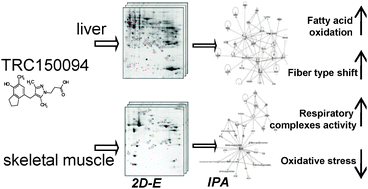Metabolic effects of the iodothyronine functional analogue TRC150094 on the liver and skeletal muscle of high-fat diet fed overweight rats: an integrated proteomic study
Abstract
A novel functional

* Corresponding authors
a
Dipartimento di Scienze per la Biologia, la Geologia e l’ Ambiente, Università degli Studi del Sannio, via Port’Arsa 11, 82100 Benevento, Italy
E-mail:
goglia@unisannio.it
Fax: +39 0824 23013
Tel: +39 0824 305138
b Dipartimento delle Scienze Biologiche, Sezione Fisiologia, Università degli Studi di Napoli “Federico II”, via Mezzocannone 8, 80134 Napoli, Italy
c Dipartimento di Scienze della Vita, Seconda Università di Napoli, via Vivaldi 43, 81100 Caserta, Italy
d Bioinformatics Lab, IRGS Istituto di Ricerche Genetiche G. Salvatore, c/o BioGeM s.c.a r.l., Ariano Irpino (AV), Italy
e Laboratorio di Proteomica e Spettrometria di Massa, ISPAAM, Consiglio Nazionale delle Ricerche, via Argine 1085, 80147 Napoli, Italy
A novel functional

 Please wait while we load your content...
Something went wrong. Try again?
Please wait while we load your content...
Something went wrong. Try again?
E. Silvestri, D. Glinni, F. Cioffi, M. Moreno, A. Lombardi, P. D. Lange, R. Senese, M. Ceccarelli, A. M. Salzano, A. Scaloni, A. Lanni and F. Goglia, Mol. BioSyst., 2012, 8, 1987 DOI: 10.1039/C2MB25055A
To request permission to reproduce material from this article, please go to the Copyright Clearance Center request page.
If you are an author contributing to an RSC publication, you do not need to request permission provided correct acknowledgement is given.
If you are the author of this article, you do not need to request permission to reproduce figures and diagrams provided correct acknowledgement is given. If you want to reproduce the whole article in a third-party publication (excluding your thesis/dissertation for which permission is not required) please go to the Copyright Clearance Center request page.
Read more about how to correctly acknowledge RSC content.
 Fetching data from CrossRef.
Fetching data from CrossRef.
This may take some time to load.
Loading related content
